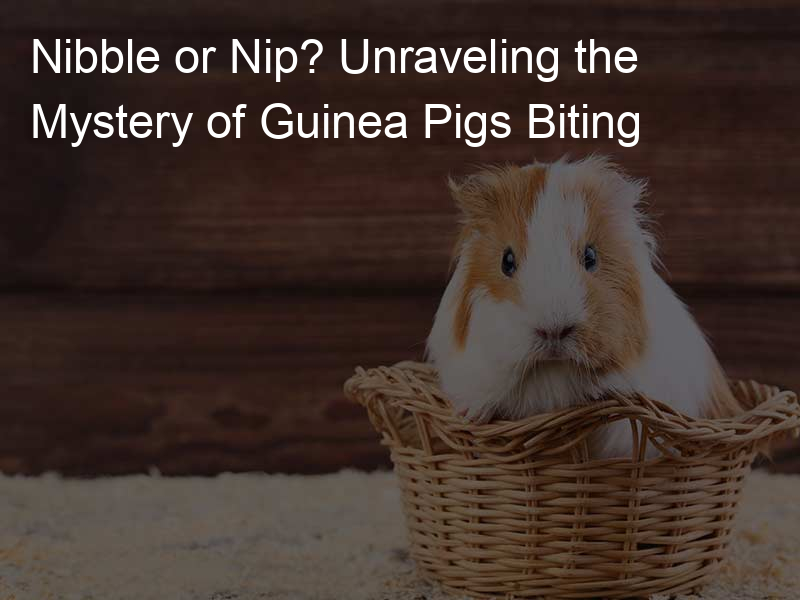Introduction: Do Guinea Pigs Bite?
They are known for their friendly and docile nature. A common question that arises is, “Do guinea pigs bite?” To answer this question, we need to delve deeper into understanding the behavior of these adorable creatures and clear some common misconceptions about guinea pigs biting.
-
- The behavior of guinea pigs
They are social animals and enjoy the company of their human companions. Like any other animal, they can bite under certain circumstances. Biting is not a natural behavior for guinea pigs. It’s usually a reaction to fear, discomfort, or stress. Their behavior can help you prevent situations that might provoke a bite.
-
- Common misconceptions about guinea pigs biting
This is not true. Guinea pigs are not naturally aggressive animals and they do not bite without reason. If they bite, it’s usually because it’s scared or uncomfortable. While any bite should be treated seriously to prevent infection, they are not typically dangerous.
Guinea Pig Behavior
Do Guinea Pigs Bite Each Other?
-
- Reasons why guinea pigs might bite each other
Might bite each other due to various reasons such as territorial disputes, dominance issues, or stress. Sometimes, it can also be a result of improper socialization or a lack of space in their cage. Monitor your guinea pigs’ behavior to identify any signs of aggression or distress.
-
- Preventing guinea pigs from biting each other
Involves creating a comfortable and stress-free environment for them. Ensure they have enough space in their cage, separate feeding areas, and plenty of toys to keep them occupied. If you notice any signs of aggression, consider separating them temporarily or consulting a vet for advice.
Do Guinea Pigs Bite Their Owners?
-
- Why guinea pigs might bite their owners
It could be a response to fear, stress, or discomfort. Sometimes, they might mistake your fingers for food, especially if you’ve just handled their favorite treats. It’s also possible that they’re trying to communicate something to you. For example, they might bite if they want to be put down or if they’re not comfortable in the way they’re being held.
-
- How to handle a guinea pig to avoid being bitten
Always approach them slowly and gently, and let them sniff your hand before you pick them up. When you do pick them up, make sure to support their entire body to make them feel secure. Avoid sudden movements and loud noises, as these can startle and make them more likely to bite. If does bite, don’t react by dropping them or shouting, as this can scare them and make them more likely to bite in the future.
Is Guinea Pig Bite Dangerous?
-
- The risks of a guinea pig bite
They can cause discomfort and, in some cases, minor bleeding. The primary risk associated with a guinea pig bite is infection. Bacteria from their mouth can enter the wound and cause an infection if the bite is not properly cleaned and treated. Additionally, they carry diseases like Lymphocytic choriomeningitis, which can be transmitted to humans.
-
- What to do if a guinea pig bites you
They likely bit out of fear or discomfort. The first step is to clean the wound thoroughly with warm water and soap. Apply an antibiotic ointment and cover the wound with a clean bandage. If the bite is deep, or if you notice signs of infection such as redness, swelling, or pus, seek medical attention immediately.
Do Guinea Pigs Have Rabies?
-
- The risk of rabies in guinea pigs
According to the Centers for Disease Control and Prevention, small mammals like guinea pigs are rarely affected by rabies. In fact, there are no known cases of guinea pigs transmitting rabies to humans. This is primarily because guinea pigs are often kept as indoor pets and have little to no exposure to wild animals that could potentially carry the rabies virus.
-
- Preventing and treating rabies in guinea pigs
This includes keeping your pet indoors and away from wild animals. If does come into contact with a potentially rabid animal, seek veterinary care immediately. While there is no treatment for rabies once symptoms appear, a vet can provide supportive care and guidance.
Can technically contract rabies, the risk is extremely low. By taking proper precautions and providing a safe environment for your pet, you can keep them healthy and rabies-free.
Guinea Pig Bite Drew Blood: What to Do?
-
- First aid for a guinea pig bite
Start by washing the wound with warm water and mild soap to clean it. Once the wound is clean, apply an over-the-counter antibiotic ointment and cover it with a clean bandage. This will help prevent infection and promote healing.
-
- When to seek medical attention for a guinea pig bite
If the bite is deep, won’t stop bleeding, or shows signs of infection (like redness, swelling, or pus), it’s time to seek medical attention. Also, if you haven’t had a tetanus shot in the last five years, you should go to the doctor. While it’s rare, guinea pigs can carry bacteria that cause tetanus.
Do Guinea Pigs Make Good Pets?
- The Behavior and Needs of Guinea Pigs
They enjoy social interaction, whether it’s with their human family or other guinea pigs. They are active during the day, which makes them a great fit for families with children. They also require a lot of care. They need a balanced diet, a clean and spacious cage, and regular exercise. Their health should be monitored closely as they can be prone to certain diseases. Wikipedia provides a comprehensive guide on guinea pig care.
- Advantages and Disadvantages of Owning a Guinea Pig
They are relatively easy to care for, they don’t require a lot of space, and they can provide hours of entertainment with their playful antics. They are also known to be less allergenic than other pets, making them a good choice for those with allergies.
There are also disadvantages to consider. They have a shorter lifespan compared to other pets, typically living for 4-8 years. They also require a lot of attention and care, which can be time-consuming. Additionally, they can sometimes be noisy, especially at night.
Do Guinea Pigs Smell?
-
- The causes of odors in guinea pigs
The primary sources are their urine and feces, which can build up in their cage if not cleaned regularly. Also have scent glands, particularly males, which they use to mark their territory. This can also produce a noticeable smell. Lastly, their diet can influence their odor. A diet high in fruits and vegetables can result in a more pleasant smell, while a diet high in processed foods can lead to a stronger, more unpleasant odor.
-
- How to prevent and manage odors in guinea pigs
The first step is regular cleaning. This includes daily spot cleaning to remove waste and a full cage clean once a week. Bathing your guinea pig can also help, do this too often as it can dry out their skin. Instead, aim for a bath once every few months.
Another factor is diet. Providing your guinea pig with a balanced diet that includes plenty of fresh fruits and vegetables can help manage their odor. Finally, make sure your guinea pig has plenty of fresh water. Dehydration can lead to stronger smelling urine.
Guinea Pig Care
Feeding and Nutrition
-
- The dietary needs of guinea pigs
They require a balanced diet of hay, fresh fruits and vegetables, and specially formulated guinea pig pellets. Hay should make up the majority of their diet as it aids in digestion and dental health. Fresh fruits and vegetables provide necessary vitamins and minerals, particularly Vitamin C, which cannot produce on their own. Finally, pellets provide additional nutrients and should make up a smaller portion of their diet.
-
- Common feeding mistakes to avoid
These include overfeeding, not providing enough variety in the diet, and feeding inappropriate foods. Overfeeding can lead to obesity and related health issues. Guinea pigs need a variety of foods to ensure they get all the necessary nutrients. Lastly, not all fruits and vegetables are safe. For example, iceberg lettuce is low in nutrients and can cause diarrhea, while avocado is high in fat and can cause health issues.
Housing and Environment
-
- Creating a suitable living environment for guinea pigs
A cage with a solid floor covered in bedding is ideal. This bedding should be changed regularly to maintain cleanliness and prevent odors. The cage should be placed in a quiet, low-traffic area of your home, away from direct sunlight and drafts. Also, require a hideout for privacy and sleep. Providing toys and tunnels will keep them entertained and promote physical activity. They should be housed in pairs or small groups to prevent loneliness. Ensure that the cage is large enough to accommodate all of them comfortably.
-
- Common housing mistakes to avoid
One of the most common is using a cage that is too small. Guinea pigs need space to move around and exercise, so a small cage can lead to obesity and other health issues. Another common mistake is using the wrong type of bedding. Cedar and pine shavings, for example, can cause respiratory problems in guinea pigs. Instead, opt for paper-based or aspen shavings. Lastly, placing the cage in a noisy or high-traffic area can cause stress to your guinea pigs. They prefer a quiet and peaceful environment.
To summarize, creating a suitable living environment for your guinea pigs involves providing a spacious and clean cage, using the right type of bedding, placing the cage in a suitable location, and providing toys and companionship. Avoiding common housing mistakes will ensure your guinea pigs are happy and healthy.
Conclusion: Managing Guinea Pig Behavior
-
- Recap of key points:
We started by addressing a common concern: Do guinea pigs bite? While they can bite, it’s often a sign of fear, discomfort, or illness. We then delved into guinea pig behavior, highlighting that these creatures are social and require companionship. We also learned, unlike many other pets, do not carry rabies.
When a guinea pig bite draws blood, clean the wound and monitor it for signs of infection. We also discovered make great pets due to their friendly and gentle nature. They do require proper care, including a clean habitat, to prevent unpleasant odors.
-
- Final thoughts on guinea pig behavior and care:
Their behavior is the first step towards building a strong bond with your pet. By recognizing their needs and responding appropriately, you can ensure that your guinea pig feels safe and loved.
Creatures with their own set of behaviors and needs. Proper care, including a balanced diet, regular exercise, and social interaction, is crucial for their well-being.






